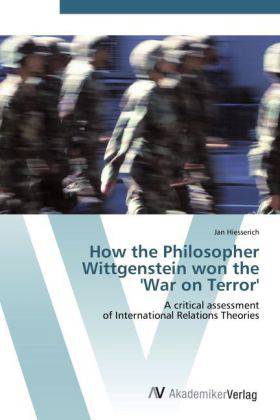
Bedankt voor het vertrouwen het afgelopen jaar! Om jou te bedanken bieden we GRATIS verzending (in België) aan op alles gedurende de hele maand januari.
- Afhalen na 1 uur in een winkel met voorraad
- In januari gratis thuislevering in België
- Ruim aanbod met 7 miljoen producten
Bedankt voor het vertrouwen het afgelopen jaar! Om jou te bedanken bieden we GRATIS verzending (in België) aan op alles gedurende de hele maand januari.
- Afhalen na 1 uur in een winkel met voorraad
- In januari gratis thuislevering in België
- Ruim aanbod met 7 miljoen producten
Zoeken
How the Philosopher Wittgenstein won the 'War on Terror'
A critical assessment of International Relations Theories
Jan Hiesserich
Paperback | Engels
€ 60,95
+ 121 punten
Omschrijving
Revision with unchanged content. This book attempts to explore an alternative methodological approach to the analysis of theoretical frameworks in International Relations (IR). It argues that the predominant methodology within the study of IR - that of positivism - is deficient and consequently inadequate in explaining human emancipation as it is based on flawed assumptions about the relations between the world and (scientific) language. By means of the Wittgensteinian philosophy, the book will dismiss the positivist claim of objectivism and introduces a meta-theoretical approach toward language. The book attempts to introduce a concept of language which denies the possibility to fix the 'essence' of language, an important prerequisite of positivist hypothesis testing, but rather views the use of language as an action in itself which depends on context. Subsequently, this approach will be applied to an analysis of the 'War on Terror'. This manoeuvre is important as it exemplifies 'language-use in action' and thereby dismisses respective deterministic approaches. In conclusion, the book argues that identities and interests of actors/objects are invested with meaning within fluid language-games. Accordingly, a sustainable solution to the 'War on Terror' requires a more anthropological and hermeneutic approach towards theory which acknowledges language as constitutive element of everyday social interaction.
Specificaties
Betrokkenen
- Auteur(s):
- Uitgeverij:
Inhoud
- Aantal bladzijden:
- 60
- Taal:
- Engels
Eigenschappen
- Productcode (EAN):
- 9783639454413
- Verschijningsdatum:
- 22/08/2012
- Uitvoering:
- Paperback
- Formaat:
- Trade paperback (VS)
- Afmetingen:
- 152 mm x 229 mm
- Gewicht:
- 99 g

Alleen bij Standaard Boekhandel
+ 121 punten op je klantenkaart van Standaard Boekhandel
Beoordelingen
We publiceren alleen reviews die voldoen aan de voorwaarden voor reviews. Bekijk onze voorwaarden voor reviews.









